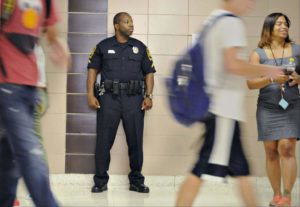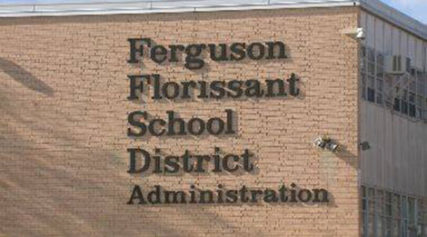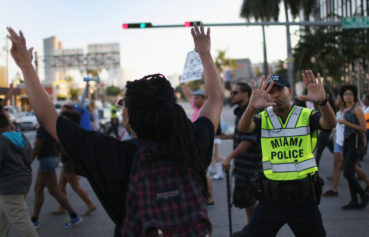
School resource officer. Image courtesy of JuvenileJusticeBlog.
In the past, disciplining a disruptive student was normally a task left to the discretion of the classroom teacher. But according to a newly released report, educators are increasingly calling on school resource officers to discipline students who’ve committed minor, non-threatening disciplinary infractions at school.
A report by the American Civil Liberties Union found that during the 2013-2014 school year, over 200,000 California school students — most of them minorities from low-income families or kids with disabilities — were disciplined by an in-school police officer for minor infractions a teacher would normally handle. More than 9,000 of those police interventions resulted in arrests, according to the report.
The worst-case scenario? Disciplined students were also reportedly strip-searched, pepper sprayed or suffered excessive force at the hands of the officer.
“In California … some districts are spending millions of dollars each year from classroom budgets to put armed police in schools,” said Linnea Nelson, education equity staff attorney for the ACLU’s Northern California branch and co-author of the report. “What we need to do is ensure schools can invest in resources that ensure a quality education for all students, like school counselors and mental health services that keep students in school.”
The ACLU report, based on national data from the United States Department of Education Office for Civil Rights, also noted the long-lasting effects of discipline under the discretion of school resource officers. Per the study, students who are arrested during encounters with school police officers are much more likely to drop out of school and end up trapped in the juvenile justice system.
This increased likelihood is particularly troubling for African-American and Latino youth, who face extreme disciplinary measures compared to their white peers. According to a report by the Brookings Institution, Black students are twice as likely to be physically punished or receive in-school suspension for disciplinary infractions. Overall, 15 percent of Black students are suspended from school in a given year.
The increasing reliance of SROs corresponds with the steady growth of their presence in schools across the nation. The Christian Science Monitor reports that in 1975, only 1 percent of U.S. schools had police officers. That number jumped to 22 percent in 1997. By the 2013-14 school year, almost 24 percent of elementary schools and 42 percent of high schools had one or more full-time resource officers, according to the publication.
Though officers are often placed in these schools to provide students and teachers with an extra sense of security, numerous incidents of violent encounters between students and in-school police have some critics questioning whether the officers are actually making schools unsafe.
Concerns over such encounters and racial disparities in school discipline are exactly why the Obama Administration encouraged schools across the nation to explicitly define the role of school resource officers and campus police. In September, a coalition of over 100 education and social justice organizations took it a step further by calling for a ban on all school-based police officers.
“Many organizations have been saying for a long time to limit the role of cops at schools, but that varied across communities,” said Nancy Treviño, communications coordinator of the Dignity in Schools Campaign. “Officially we’re coming out as a large body of folks from around the country and collectively saying we want see cops out of school.”
Nelson said the next step for California schools would be to adopt the ACLU’s suggestions, which include ensuring that teachers call on officers only when there’s a serious threat. Devoting funds for more counseling and mental health services, along with training to help teachers resolve conflicts in a manner that keeps kids in school, were also among the group’s recommendations.

